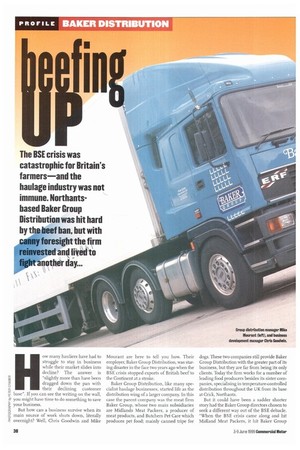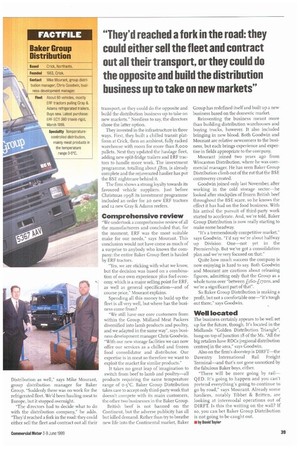The BSE crisis was catastrophic for Britain's farmers—and the haulage
Page 40

Page 43

If you've noticed an error in this article please click here to report it so we can fix it.
industry was not immune. Northantsbased Baker Croup Distribution was hit hard by the beef ban, but with canny foresight the firm reinvested ant lited to fight another day...
ow many hauliers have had to struggle to stay in business while their market slides into decline? The answer is -slightly more than have been dragged down the pan with their declining customer base". If you can see the writing on the wall, you might have time to do something to save your business.
But how can a business survive when its main source of work shuts down, literally overnight? Well, Chris Goodwin and Mike Mourant are here to tell you how. Their employer, Baker Group Distribution, was staring disaster in the face two years ago when the BS E crisis stopped exports of British beef to the Continent at a stroke, Baker Group Distribution, like many specialist haulage businesses, started life as the distribution wing of a larger company. In this case the parent company was the meat firm Baker Group, whose two main subsidiaries are Midlands Meat Packers, a producer of meat products, and Butchers Pet Care which produces pet food; mainly canned tripe for dogs. These two companies still provide Baker Group Distribution with the greater part of its business, but they are far from being its only clients. Today the firm works for a number of leading food producers besides its sister companies, specialising in temperature-controlled distribution throughout the UK from its base at Crick, Northants.
But it could have been a sadder shorter story had the Baker Group directors chosen to seek a different way out of the BSE debacle. "When the BSE crisis came along and hit Midland Meat Packers, it hit Baker Group Distribution as well," says Mike Mourant, group distribution manager for Baker Group. "Suddenly there was no work for the refrigerated fleet. We'd been hauling meat to Europe, but it stopped overnight.
"The directors had to decide what to do with the distribution company," he adds. "They'd reached a fork in the road: they could either sell the fleet and contract out all their transport, or they could do the opposite and build the distribution business up to take on new markets." Needless to say, the directors chose the latter option.
They invested in the infrastructure in three ways. First, they built a chilled transit platform at Crick, then an ambient, fully racked warehouse with room for more than 8, c.co pallets. Next they updated the haulage fleet, adding new split-fridge trailers and ERF tractors to handle more work. The investment programme, totalling about £8m, is already complete and the rejuvenated haulier has put the BSI nightmare behind it.
The firm shows a strong loyalty towards its favoured vehicle suppliers. Just before Christmas 1998 its investment programme included an order for 20 new ERF tractors and 12 new Gray & Adams reefers.
Comprehensive review
"We undertook a comprehensive review of all the manufacturers and concluded that, for the moment, ERF was the most suitable make for our needs," says Mourant. This conclusion would not have come as much of a surprise to anybody who knows the company: the entire Baker Group fleet is hauled by ERF tractors.
"Yes, we are sticking with what we know, but the decision was based on a combination of our own experience plus fuel economy, which is a major selling point for ERF, as well as general specification—and of course price," Mourant explains.
Spending all this money to build up the fleet is all very well, but where has the business come from?
"We still have our core customers from within the Group. Midland Meat Packers diversified into lamb products and poultry, and we adapted in the same way", says business development manager Chris Goodwin. "With our new storage facilities we can now offer our services as a chilled and frozen food consolidator and distributor. Our expertise is in meat so therefore we want to exploit the market for similar products."
It takes no great leap of imagination to switch from beef to lamb and poultry—all products requiring the same temperature range of o-5°C. Baker Group Distribution takes care to accept only third-party work that doesn't compete with its main customers, the other two businesses in the Baker Group. British beef is not banned on the Continent, but the adverse publicity has all but killed demand. Rather than try to breathe new life into the Continental market, Baker Group has redefined itself and built up a new business based on the domestic market.
Reinventing the business meant more than building distribution warehouses and buying trucks, however. It also included bringing in new blood. Both Goodwin and Mourant are relative newcomers to the business, but each brings experience and expertise in fields appropriate to the company
Mourant joined two years ago from Wincanton Distribution, where he was commercial manager. He has seen Baker Group Distribution climb out of the rut that the BS E controversy created.
Goodwin joined only last November, after working in the cold storage sector—he looked after stockpiles of frozen British beef throughout the BSE scare, so he knows the effect it has had on the food business. With his arrival the pursuit of third-party work started to accelerate. And, we're told, Baker Group Distribution is now really starting to make some headway.
"It's a tremendously competitive market," says Goodwin. "I'd say we're about halfway up Division One—not yet in the Premiership. But we've got a consolidation plan and we're very focused on that,"
Quite how much success the company is now enjoying is hard to say. Both Goodwin and Mourant are cautious about releasing figures, admitting only that the Group as a whole turns over 'between L160-1170rn, and we're a significant part of that".
So Baker Group Distribution is making a profit, but not a comfortable one—"it's tough out there," says Goodwin.
Well located
The business certainly appears to be well set up for the future, though. It's located in the Midlands "Golden Distribution Triangle", bang on top of Junction 18 of the Mi. "All the big retailers have RDCs [regional distribution centres] in the area,' says Goodwin.
Also on the firm's doorstep is DI RFT—the Daventry International Rail Freight Terminal—and that's not gone unnoticed by the fabulous Baker boys, either.
"There will be more going by rail— QED. It's going to happen and you can't pretend everything's going to continue to go by road," says Mourant. Already some hauliers, notably Tibbet & Britten, are looking at intermodal operations out of DIRFT. Is this the writing on the wall? If so, you can bet Baker Group Distribution is not going to be caught out.
• by David Taylor














































































































